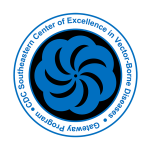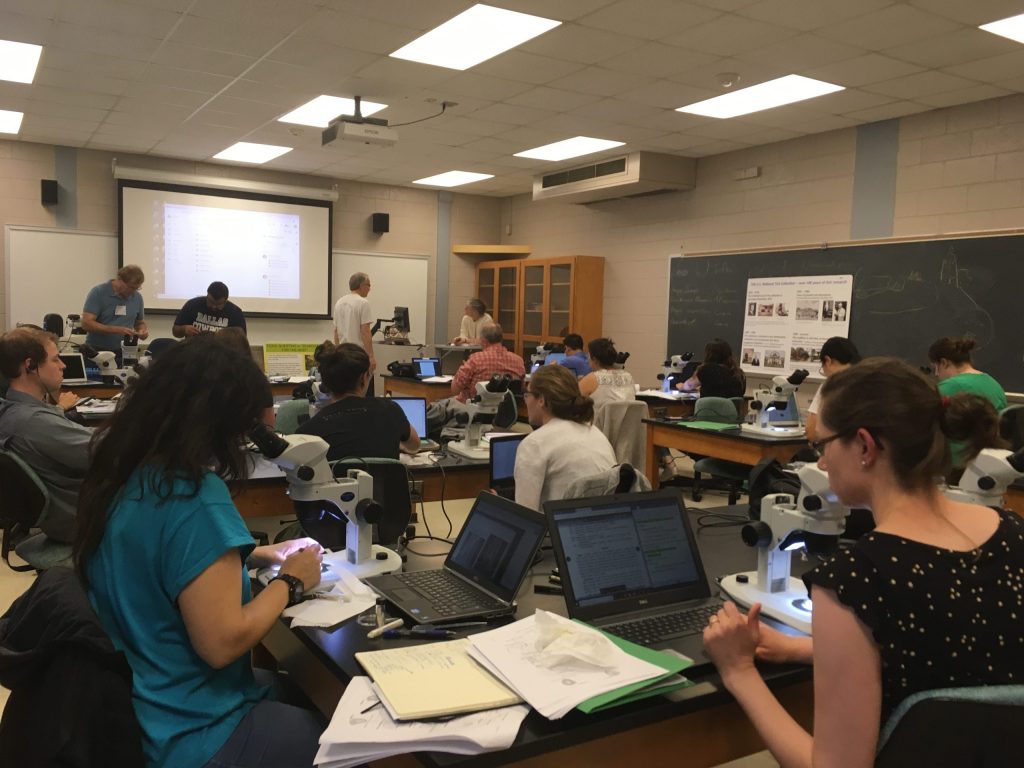
GSU Tick Workshop
This intensive, two-week workshop was developed for students, state public health officials, and scientists involved in vector research. The workshop provided information on tick behavior, systematics, ecology, physiology, and associated pathogens, as well as methods for surveillance.



The Annual Tick Workshop was a collaboration between the U. S. National Tick Collection at the James H. Oliver, Jr., Institute for Coastal Plain Science (Georgia Southern University) and the CDC Southeastern Center of Excellence in Vector Borne Diseases (SECVBD) held in 2018 and 2019 at Georgia Southern University (Statesboro, GA). We thank Dr. Lorenza Beati, GSU Professor and Curator of the U.S. National Tick Collection, for her effort hosting and coordinating the training. The SECVBD provided support to offset costs associated with the Workshop.
Mission statement for the Tick Workshop: If we are to respond appropriately to vector-borne disease threats in the United States, it is critical that existing skills and knowledge are conveyed to the next generation of public health entomologists. In the same vein, advanced research findings must find its way back in the form of comprehensible, operationally sound “best practices”. Professional training for individuals who have career trajectories aligned with public health entomology must have varying levels to permit the growth of the trainee intellectually and as a result the expansion of the discipline as a whole.
2022 GSU Tick Workshop Update
As of December 2021, Dr. Lorenza Beati plans to hold the 2022 GSU Tick Workshop in person, from May 14th – May 28th, 2022. For more details and to submit a “Workshop Interest” form, please see the GSU website: https://cosm.georgiasouthern.edu/usntc/center-of-excellence-tick-workshop-2022/
Topics that will be covered in the 2022 Tick Workshop include:
Tick systematics, identification, classification, population genetics, phylogeography (morphological and molecular taxonomy).
Visit of the U.S. National Tick Collection
Tick ecology, behavior
Field collecting experience
Tick anatomy, physiology
Tick surveillance methods
Spatial modeling of distribution
Tick control
Tick-Borne diseases: bacterial (Lyme, rickettioses, anaplasmoses, ehrlichioses), viral, and protozoic, including, clinical aspects, diagnosis, microbiology, ecoepidemiology.
Workshop Participants learned about variety of topics :
Tick systematics, identification, classification, population genetics, phylogeography (morphological and molecular taxonomy)
Visit of the U.S. National Tick Collection
Tick ecology, behavior
Field collecting experience
Tick anatomy, physiology
Tick surveillance methods
Spatial modeling of distribution
Tick control
Tick-Borne diseases: bacterial (Lyme, rickettioses, anaplasmoses, ehrlichioses), viral, and protozoic, including, clinical aspects, diagnosis, microbiology, ecoepidemiology

Fellowship Awardees

2019
Molly Baker (MO)
Nicole Breuner (CO)
Jannelle Couret (RI)
Scott Darrough (MO)
Savannah Duke (AL)
Gillian Eastwood (VA)
Juan Garcia Jr (TX)
Erica Hernandez (IL)
Aine Lehane (CO)
Sarah Maes (CO)
Alynn Martin
Tiffany Thuy-Vi Nguyen (GA)
Angela ONeil (TX)
Christina Parise (CO)
Rachel Pigg (SC)
Annie Rich (GA)
Dominic Rose (CO)
Valentina Tagliapietra (Italy)
Yuexun Tian (FL)
Chaoyang Zhao
2018
Alexis M Barbarin (NC)
Chanakya Bhosale (FL)
Lesly Carolina Calix
Cory Casal (MD)
Carrie De Jesus (FL)
Emily Dinh (FL)
Claudia Ganser (FL)
Andrew Haddow (MD)
Zachary Kaplan (FL)
William Kessler (FL)
Kimberly Ledger (FL)
Catherine Loudon (CA)
Shabab Nasir (Pakistan)
Didot Prasetyo (Laos)
Elizabeth Snapp (MD)
Khamsing Vongphayltoh (Laos)


